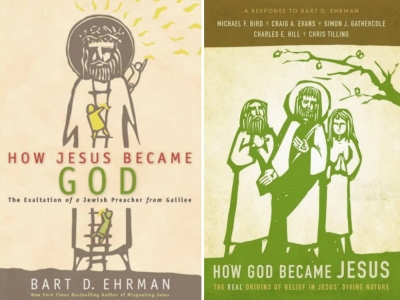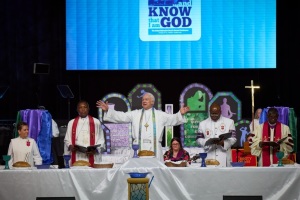Theologians Challenge Bart Ehrman's Scholarship in 'How Jesus Became God' With Book on 'How God Became Jesus'

Correction Appended
Bart Ehrman, prolific author, New Testament scholar and former evangelical Christian, says it took him eight years to research and complete his new book, How Jesus Became God: The Exaltation of a Jewish Preacher from Galilee. Yet, a group of fellow scholars responded in their book, How God Became Jesus, by claiming that the Christian-turned-agnostic's scholarship on Jesus' divinity leaves much to be desired.
Ehrman, the James A. Gray Distinguished Professor of Religious Studies at the University of North Carolina-Chapel Hill, says his research reveals that Jesus, a first century Galilean, never claimed to be God, and that it was his followers who elevated him to a deity after his death.
"What I argue in the book is that during his lifetime, Jesus himself didn't call himself God, didn't consider himself God and that none of his disciples had any inkling at all that he was God," Ehrman has said.
Ehrman ultimately concludes in his work that there is no reliable evidence to support the belief that Jesus was ever resurrected from the dead, even though it is the most essential aspect of Christianity. Instead, his followers had "visionary experiences," or hallucinations of Jesus after his burial that led them to determine that Christ was alive.
Ehrman discusses his latest published work in a lengthy interview with NPR's "Fresh Air." Listen below, or at NPR.com.
Ehrman's newly published findings have been resoundingly challenged by some of his peers, a group of which has put forth their own book in response to his work, which one reviewer described as "populist conspiracy theories and sloppy history."
How God Became Jesus: The Real Origins of Belief in Jesus' Divine Nature—A Response to Bart D. Ehrman was written by Christian historians Michael F. Bird, Craig A. Evans, Simon Gathercole, Charles E. Hill, Chris Tilling. The book was released the same day as Ehrman's, with Bird apparently being the main initiator of developing a response.
Bird, Lecturer in Theology at Ridley Melbourne College of Mission and Ministry and author of several theology titles, revealed that his team was "very graciously given the opportunity to read a pre-publication copy of Ehrman's book" and upon receipt immediately went to work.
Bird and company applaud Ehrman for his "challenging and thought-provoking book," yet remain unconvinced by his claims and conclusions.
"Bart Ehrman's book...has an number of perceptible strengths. Not only is it well-written and you'll learn a lot about ancient history and the early Church from it, but what I like the most is that Ehrman forces people to ask a very important question. Namely, who is Jesus?" says Bird in a video on How God Became Jesus.
Yet, the authors claim to "offer a better, historically informed account of why the Galilean preacher from Nazareth came to be hailed as 'the Lord Jesus Christ,'" according to a description of How God Became Jesus. They insist, contrary to Ehrman's findings, that "the exalted place of Jesus in belief and worship is clearly evident in the earliest Christian sources, shortly following his death, and was not simply the invention of the church centuries later."
Bird, in a submission made to The Christian Post, argues for "5 Lines of Evidence Missing from Ehrman's Latest Popular Study, How Jesus Became God." Read it here. Bird explains how he and his colleagues' challenges to Ehrman's work in the video below.
Correction: April 25, 2014
An article on April 24, 2014, attributed comments describing Bart Ehrman's work in How Jesus Became God as "populist conspiracy theories and sloppy history" to authors Michael F. Bird, Craig A. Evans, Simon Gathercole, Charles E. Hill and Chris Tilling. The attribution was incorrect. The remark was made by a reviewer of Ehrman's book.




























